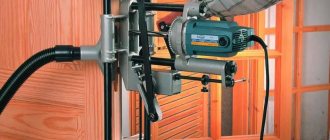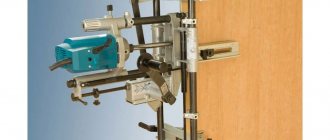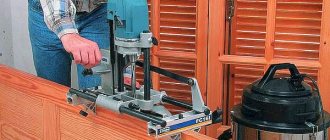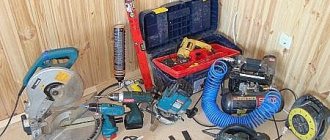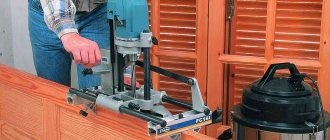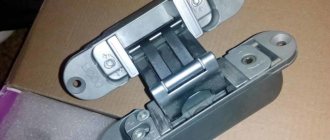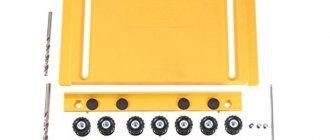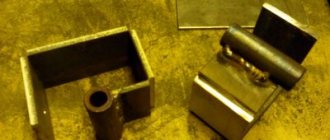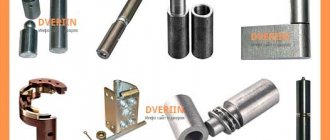Do-it-yourself carriage for a milling machine – Machine tools, welding, metalworking
We will try to answer this question in our article. For those who make wooden products on their own, a router (especially a manual one) is an indispensable assistant.
The power tool itself, even if equipped with an excellent set of cutters, is completely useless without additional accessories. It is impossible to hold a working milling cutter within a given trajectory with your hands.
The rotating cutter will move chaotically, reacting to the vibrations of the tool and the structure of the material being processed. Even the owner of steel muscles and a hawk's eye will not be able to work with this tool without the use of guides and fixing devices.
This is what a wood router looks like
Basic devices are usually included with power tools, but they can only be used to perform simple tasks. More complex guides and templates have to be purchased for additional money, while many of them can be made by hand.
The main thing is to have an idea of how this device looks and works. There is no need to look for ready-made drawings and complex technical calculations. Any master knows better how to make this or that device. The efficiency and convenience of work will be higher, not to mention the savings.
Mechanical assistants for hand router
The most common device that is included in the basic kit.
Rip fence
Accessory - Rip fence
The design is so simple that making it yourself will not be difficult. A guide plane is selected relative to the line of passage of the cutter (in some cases this may be the smooth edge of the workpiece itself), along which the milling cutter moves.
The stop can be any flat, oblong object connected to the tool with a fixed rod. For reliability, there can be two rods.
The surface of the guide must be smooth for free sliding. The stop needs to be calibrated.
To do this, a control groove is cut in the workpiece, the distance to it relative to the edge of the workpiece is measured, and the zero mark is fixed. By moving the stop along the rod, you can set any distance with high accuracy.
The rip fence is used for milling grooves and processing the edges of the product, including selecting a quarter. It is also possible to cut blanks of the same width.
Compared to an electric jigsaw, the cut obtained with a milling cutter is smoother and of higher quality. Only the cutter should be of small diameter to save material.
The device can be used when processing rounded surfaces. To do this, a gasket with a cutout in the form of an obtuse angle is installed between the stop and the rounded end of the workpiece.
Popular: Types of wood cutters for a hand router
Guide rail
This device is no different in function from a rip fence, and is designed to ensure directed movement of the cutter along a given path.
A useful assistant when working with a router - a guide rail
The main difference is the ability to choose the angle of movement of the router. To do this, the guide is fixed on the surface to be treated using clamps or suction cups. You can make such a device yourself from a profile or corner of a suitable size.
It's good to use an old curtain rod. The main thing is to ensure free movement of the carriage along the guide. For a more stable fixation, it is better to use not one, but two rods. If the width of the workpiece being processed is greater than the length of the rip fence bar, you cannot do without a guide bar.
Using such a device, you can mill grooves along a broken line or trim the edge of a product along a complex trajectory. To do this, the milling cutter stops at the break point, the fastening is given to the guide, which rotates at a given angle relative to the previous direction.
In this case, the cutter remains in the workpiece, acting as an axis of rotation. The guide is then fixed again and milling continues in the new direction.
More advanced models have the ability to change the angle of inclination of the router relative to the vertical. This allows you to significantly expand the possibilities of using power tools.
Compass for router
The purpose of this device is clear from the name. Used for milling grooves in a circle or cutting out circles.
Want to make a perfect circle? You will need a compass for the router
The principle of operation is simple. A guide rod with a groove or a plate with calibrated holes is used as a compass leg, allowing you to cut circles of any diameter. A pin is fixed in the center of the proposed circle, around which the entire structure moves. But at the other end of the guide there is a router.
Factory compasses for a router can have a variety of designs. A rod with a support platform and a hinge (the design with two rods is more stable), a plate with a slot or calibrated holes.
Template for cutting circles
The main thing is to ensure reliable fixation of the central pin, otherwise the structure may shift due to vibration and the workpiece will be damaged. You can make such a device yourself from any durable and smooth material, for example, textolite.
Homemade device for cutting circles
A carriage with a fixing device moves in a sawn groove; holes are provided for attaching the router. There are also more complex devices for forming ovals.
It is based on the same design as the compass, but instead of an axis of rotation, a support with a cross system of grooves is used. Moving along them, the virtual axis constantly shifts, resulting in the formation of a regular oval.
Device for cutting oval holes with a router
Using such a tool, you can make oval cuts both around the nozzle and next to it. The possibilities for choosing the path of movement of the cutter are practically unlimited.
Copy sleeve
Sometimes it becomes necessary to mill a complex pattern or replicate identical cutouts. For convenience and increased speed of work, pre-made templates are used. For example, a template is often used - a tenon cutter.
Copy sleeve or copy ring
Or it becomes necessary to cut several identical recesses for door hinges. Copy rings are used to move the router along the contour of the template. The sleeve rests against the template, and the cutter exactly copies its profile.
Top rating templates for inserting hinges and locks into interior doors
Door hinge installers need to have a set of good construction equipment. Along with the usual set, they use a template for inserting hinges and locks. A milling device is needed when installing door hardware.
Why do you need a template for a router?
To buy a template for inserting hinges and locks, you need to study their types and operating features. In fact, there are only two types of them.
- Most models of templates for a router are made in the form of a base and a variety of inserts for each type and size of fittings. They are very inconvenient to use, since you will always have to buy new inserts and carry a large bag with these inserts.
- But there are also more modern and universal tools for inserting fittings into interior doors. On such devices for installing fittings, all sizes are quickly adjusted on the machine itself for inserting hinges and locks.
Below we describe in detail the pros and cons of each tool for installing hinges and locks. Based on the professional opinion of installers of interior doors, we will draw the right conclusions and reveal the whole truth about templates for inserting locks and hinges.
What template do professional craftsmen choose for inserting hinges and locks?
Qualified installers meticulously select the right tools from the variety offered. They know that the slightest mistake will ruin expensive doors and they will have to pay for them.
Carriage for the UVK-Profi router.
The market leader among templates for inserting hinges and locks. Surpasses similar construction equipment in cost, service life, convenience and functionality. Produced by the domestic company Master Profi, which produces professional and amateur tools for inserting fittings into interior doors. They know what is needed for precision when installing fittings.
Material used in the production of ufk-porfi: processed duralumin, structural textolite, polyacetal, capralon, hardened 16 mm stainless steel shafts are used to move the matrix, the vice is made of 8 mm steel shafts. using trapezoidal thread.
Linear bearings are enlarged, closed type, made in Germany. Plastics and other fragile materials are not used in the tool for installing hinges and ufk-pro locks.
This tool is capable of installing any fittings, even those that have just appeared on the market. The work with it is so precise that it seems as if the fittings were installed at the factory.
- From standard locks to hidden hinges of any complexity, UVK-Profi copes with the task perfectly.
- A universal and adjustable device for a router, it cuts any hinges (hidden ones too) into the door leaf and frame simultaneously.
- Suitable for mounting all types of lockable mechanisms without the use of other tools.
Advantages of the ufk profi fitting template:
- The only existing tool that has a complete absence of errors when installing fittings. Perfectly accurate factory insert;
- Works without auxiliary kits, tools or inserts. One compact device will install absolutely any fittings in interior doors;
- Ease of use. No special skills or education are required for the job; simple adjustment to the hinge or lock that needs to be installed takes no more than 1 minute;
- Works with all types of routers;
- Installation of all types of hinges is carried out simultaneously in the door leaf and frame;
- Will embed bolts of all sizes and hidden hinges;
- Installation of locks can be done on doors already installed in the opening;
- The router template is securely attached using the built-in vice;
- For instant positioning of the carriage relative to the edge of the canvas or box, special markings are provided;
- Compact and convenient tool (weight 3.2 kg).
Built-in template vise, designed with two independent elements, support and clamping vise are adjustable independently of each other. This makes it possible:
- Even faster and more accurate sizing adjustments. After working with the carriage a couple of times, you will know exactly how to set the vice (based on the width of the box or blade) to instantly embed any fittings without adjustment;
- Quickly shift the center of the cut;
- Increase the working width. Used for new wide boxes (150-200 mm) and simultaneous insertion of hinges.
The UVK-Profi universal carriage for inserting hinges is worth buying because it is recommended by all experienced specialists. They always use the best tools in their work.
Numerous positive reviews indicate that the UVK-Profi tool for installing locks and hinges has established itself as the best universal template, which has no analogues in the quality of insertion, ease of use and reliability. Customers note that door hardware is installed in a matter of minutes.
Compared to similar tools, the UVK-Profi carriage is much cheaper, but it is lighter, more functional and more convenient to use.
Website of the official manufacturer where you can buy a template for inserting hinges and locks: https://master-profy.ru/ Address: M.O. Balashikha microdistrict Kuchino st. South house 9. Opening hours: Weekdays from 10:00 to 20:00, weekends from 12:00 to 18:00.
Video review and instructions for working with the tool. Information taken from the official source of the manufacturer:
Virutex hinge template
One of the analogues with a factory insert. Unfortunately, it has a number of negative aspects:
- Only a branded router is used in the work. If any part breaks, buying another model will cost less;
- It takes a long time and is difficult to adjust the desired size;
- For each type of service - inserting hinges, locks and hidden hinges - a separate tool is required. The estimated cost of three devices exceeds 160,000 rubles;
- When inserting hinges, it is not possible to embed them simultaneously into the box and the canvas;
- The bolt does not cut in at all;
- The specialist will be forced to transport two instruments with a total weight of 15 kg, which is very heavy.
In general, there are positive reviews. The result is a high-quality and even insert.
Template for inserting Gidmaster locks
Compared to the previous model, this jig for inserting locks is a fairly cheap option (around 12,000 rubles). But it is far from universal and is only useful when working with locks. Yes, and the insertion is only possible with a drill.
Before purchasing this model, it is important to consider that:
- There will be inaccuracies in sizing adjustments;
- The drill works worse than the router; its speed is too low. Torn edges form in the form of unevenness and chips on enamel doors;
- Only cutters with threaded collets are suitable. There are no such cutters on the market; you will have to order thread cutting from a turner each time.
- This jig is not intended for installing hinges, bolts and strikers.
Templates for a router with inserts and copy sleeves
Templates for inserting hinges and locks with replaceable inserts are more suitable for amateur use. But the work will take a lot of time, because there are many configurations and sizes.
In this case, you will have to spend much more money than planned. Purchasing a minimum set that is suitable only for 5 types of hinges, locks, hidden hinges, latches and strike plates will cost 15,000 rubles. For a standard set in which you can embed 30% of the existing fittings, you will have to pay at least 25,000 rubles.
Today, the complete package of inserts includes over 200 pieces. The cost of each insert is 300-500 rubles. not counting the price of the base itself for inserts and copying sleeves, all this pleasure is estimated at over 65,000 thousand rubles.
The high cost of a kit with which you can work is not the main problem with templates for an insert-based router.
- It will not be possible to place everything compactly, and chaos in the set will affect the quality and efficiency of the service.
- Over time, more and more fittings appear, inserts for which are impossible to manufacture and cover everything.
Insert templates have their disadvantages:
- There is an error when installing the fittings. Inserts are designed for a specific size, and any fittings have tolerances of +-0.5-1.5 mm;
- You cannot cut hinges into the leaf and the door at the same time;
- It will also not be possible to cut hinges into new wide boxes;
- Unreliable and dangerous fixation with clamps;
- Without securing the router, you can get injured;
- There is no possibility to embed the bolt;
- Setting the indents and positioning of the template takes about 15 minutes for each type of fittings. (information taken from video reviews).
The number of required inserts is updated every month. Old inserts for fittings that are no longer in demand will need to be constantly updated and new ones purchased. In some video reviews, door installers said that they had 300 pieces. inserts with a total weight of 40 kg. And every year there are more and more of them.
Which tool is better to buy?
Based on the above, the UVK-Profi universal template for inserting hinges and locks has no analogues. It ranks at the top of all reviews where similar models are compared. This is confirmed by reviews from professionals who have been using only this model for years.
When purchasing a tool, you should definitely opt for the improved version with a vice. It is more compact and functional than previous models.
Do-it-yourself carriage for a milling machine
For accurate operation, a milling cutter requires auxiliary devices; at the same time, the sales package of the device includes a limited set of such items.
The market for milling attachments extends from protractors to numerous attachments. The user, for whom this is not enough, can make auxiliary devices himself.
Templates and copy sleeve
The copying ring is a circle with a protrusion that slides along a template, guaranteeing accuracy of processing.
The ring can be screwed to the base of the router or secured with antennae.
The diameter of the device is selected so that it does not come into contact with the working part of the tool.
The ring template is fixed on the material being processed, firmly adhering to the tabletop.
Reliable clamping is provided by double-sided tape and clamps.
Having finished the part, you need to make sure that the sleeve fits tightly along the edge of the template when working.
A self-made template for a router can also be used for processing the corners of a part, when it is necessary for them to be round. Depending on the location and dimensions of the template, the radius size of the rounding can be any.
The template design often includes bearings or rings. If this is a ring, then it should be selected according to the size of the cutter.
If there is a difference in diameters, it is necessary to add stops to the template design, with the help of which you can move the device away from the edge of the part.
The special design of the accessory makes it possible to effectively create recesses for door hinges.
Using a template, you can even carry out decorative work with a router, for example, cutting out wooden patterns.
Compass
This auxiliary tool is designed to create round and oval cutouts.
The basic compass design includes a rod with a pin fastening at the end.
By inserting the fastener into the hole in the center of the circle along which the groove is made, you can change the size of the circle by simply moving the rod.
Note! The convenience and reliability of the design is increased by adding a second rod.
There are various auxiliary elements that work on the circular principle.
They offer the advantage of creating different radii of circular grooves.
A mandatory component of such auxiliary devices is a pin with a screw for adjusting the length of the radius.
If a small hole is cut, the compass structure must be adapted for mounting on the base of the router. When processing a part, the pin is located directly under the tool.
A wood router, in addition to round ones, is also capable of cutting elliptical holes. The device for this can be assembled with your own hands from the following parts:
- base with fixation on material made of screws or suction cups;
- shoes moved on crossing guides – 2 pcs.;
- rods for installation – 2 pcs.;
- bracket for connecting the structure to the tool.
The fastening bracket, thanks to the grooves intended for this purpose, allows the frame of the structure to be in the same plane as the base of the router.
Cutting round openings is done using one shoe. If you need an oval hole, both are used.
This auxiliary design makes it possible to make holes more accurately and faster than other tools, such as a band saw or jigsaw.
For grooves on narrow surfaces
Recesses for locks or door hinges can be made with a drill and chisel, but a router is much better suited for this. You just need to equip the tool with a certain device.
It consists of a flat plate that is attached to the base of the device. The shape of the plate can be round or rectangular.
2 pins are made on it, ensuring smooth movement of the tool during operation.
The main parameter that must be adhered to when manufacturing such an element is that the axis of each pin must be on the same line as the center of the cutter.
If this parameter is observed, the groove will be cut exactly in the middle of the workpiece, regardless of thickness.
If it is necessary to shift the groove to the right or left, a sleeve of the size needed for the desired shift is put on the corresponding pin.
Using this design, the router is driven with the pins tightly pressed to both sides of the workpiece.
The same effect is achieved if you use two parallel stops with a router.
Even one stop may be enough. It is necessary to strengthen the workpiece between two surfaces, for example boards, so that all three elements are in the same plane. In this case, the problem of insufficient part width is eliminated.
Tips and tricks
When choosing a device for a lathe, you should decide on the volume and type of work performed, and their accuracy. Then select the appropriate model according to the size of the equipment.
To produce single parts for repairing cars and home appliances, a simple device that fixes the part and moves it relative to the rotating chuck with the tool is suitable.
For a private workshop engaged in the manufacture of parts and simple products, it is worth buying a milling head and making complex parts with high productivity and accuracy.
When the workload is low, a milling device can replace a machine. At the same time, it does not require space for placing equipment, and saves time on reinstalling the workpiece from one operation to another.
DIY accessories for a wood router
The functionality of milling equipment can be significantly expanded by using special devices. Serial accessories that can be found on sale are quite expensive. That is why many craftsmen decide to make accessories for a wood router with their own hands.
Most of the manufactured elements are intended for the correct placement of hand tools in space. In addition, accessories for a wood router can significantly increase the accuracy of processing. Some instruments come with accessories out of the box.
However, they are not highly specialized equipment and are often not suitable for the assigned tasks. Let's take a closer look at the most common equipment.
DIY accessories for a wood router
Milling table with built-in router for the workshop
The most popular and least expensive option for use in a wide variety of workshops (home and small industrial) is the option of a manual router built into a special work table. The versatility and quick reconfiguration for manual milling with a sufficient level of quality and individual solutions have made such milling machines extremely popular both among home craftsmen and among small production workshops.
Some of the milling cutters already have a built-in microlift, which simplifies its use and is extremely convenient to use.
Using such a table in combination with a manual router when processing wood products allows you to achieve excellent results, with quality at the level of professional milling machines.
DIY accessories for a wood router: stops, templates, guide rails
For accurate operation, a milling cutter requires auxiliary devices; at the same time, the sales package of the device includes a limited set of such items.
The market for milling attachments extends from protractors to numerous attachments. The user, for whom this is not enough, can make auxiliary devices himself.
Types of tables
- Tabletop (portable) table.
These tables are compact in size, light weight and can be installed on any work surface. For example: American portable milling table Kreg PRS 2100. Has a steel base
English Milling table Trend CraftPro
Homemade versions of these tables can be of various types, ranging from a simple tabletop with a router and a side support made of plywood:
and simple cabinet tables with a router:
Often, plexiglass is used as a plate for installing a router into a table.
- Stationary milling table (personal, non-portable)
These tables have a working height that provides comfortable standing work - 800-900 mm. In some cases, tabletops may be height adjustable. Serial samples usually have an aluminum base (for example, such as INCRA):
or steel base (as in Craig milling tables):
The base can be made from furniture panels (professional table CMT):
A special place among milling tables is occupied by the Festool milling table with a universal removable plate and mount for any Festool router. In essence, this is a lightweight, but at the same time well-equipped version of a milling machine for both work in the Workshop and on the road.
With folded legs, the festul table turns into a tabletop version:
Wide range of equipment and quick setup make it an indispensable assistant for many professional Craftsmen.
Homemade stationary options sometimes look no worse than factory tables: Custom milling tables can be made using standard elements from serial tables: a milling plate, profiles and tires, tabletops, stops. For example, based on Kreg components:
Examples where the KREG Combo-Trak guide profile (combined rail) and KREG pressure combs are used
Table with KREG plate
or INCRA (profile guides, router lift) Positioner INCRA M-LS25SYS:
In some cases, industrial tables are also modified, improving their functionality. KREG PRS 1045: The simplest and most useful improvement is, of course, the integration of drawers for cutters, tools and other accessories.
You can also use the side surfaces of the table to secure on their outside the tools or accessories necessary for work.
Admirers of the INCRA brand also try to improve the useful properties of the table. Milling table INCRA M-RT COMBO 3 Multifunctional (not only milling) table A stationary table can simply be a milling table, like those shown above. But it can also be multifunctional, universal, combined with a workbench, assembly table, stationary saw, etc.
INCRA and KREG accessories are actively used in the design of tables. For example: stop and positioner Incra
The large working surface of such a universal table, on the one hand, expands possibilities, and on the other hand, saves both space and resources.
Making a carriage for a router
In order to design a CNC machine, it is necessary to use several variants of units. Non-factory-made devices often have rails from the carriage of a printing machine, as well as a printer. The main quality indicators irreversibly affect the processing performance and devices based on a milling machine with a tenoning carriage, so excessive savings can only do harm.
Details
Most often, polished shafts are used, which are inexpensive. Purchasing these items will not be difficult. They are subject to mounting and processing. Most often made of durable steel.
After this, the top layers are subject to induction hardening, which has a beneficial effect on the period of use and wear rate. Ideal smoothness makes it possible for the carriage to move over the polished layer extremely successfully. The shafts can be fastened at both ends with two hands without unnecessary problems.
But there are also many counterfeit elements made of low-quality metal on the market, since the likelihood of an accurate on-site inspection is zero.
Flaws:
- The base is not fixed. The shaft can only be supported by two fastening devices. This makes it possible to significantly facilitate installation by hand, but at the same time independent of the table support. Because of this, the possibility of defects during product processing increases. Over time, lathe carriage guides roll and become bent.
- There is sagging at long intervals. Due to sagging, a shaft with a length of more than 100 cm is not used when processing for a machine. The thickness and length of the gross surface also matter. The best option is 0.05, and even more profitable is 0.06 - 0.1.
Bearings in the carriage for a router
There are two types of bearings when installing guides:
- Bushings for ball elements.
- Bearings to provide a sliding surface.
Ball cylindrical fairings, as well as parts for ensuring rolling, have two significant disadvantages compared to rail carriages: an insignificant level of load capacity and a rather large backlash. To ensure weight support, the tenoning carriage is installed on a guide line with several shafts.
Disadvantages of this type of bearings:
- Withstands light load.
- Formation of high pressure due to low operating life. The need to periodically replace the shaft due to the formation of a groove.
- Sawdust and sticky dust clog the slots.
Bearings to ensure sliding on the surface are made from non-hard metals such as caprolon. If all tolerances are maintained, the load-carrying capacity and precision of the sliding bearing are quite high. However, sawdust and dirt cannot harm the unit. But this only applies to bronze parts that are well processed.
Over time, wear occurs on the product, which requires periodic adjustment to get rid of gaps. As a rule, more affordable bearings are used for making them yourself.
Shafts for splined bushings
Certain bushing balls move inside the longitudinal shaft. The design has a high level of rigidity, much stiffer than conventional shafts after grinding. They also have a longer period of use. Torsion shaft reinforcements are of additional importance. They can be very successfully installed on the shaft mounting structure.
A significant disadvantage of the spline guide is its high cost. This is the reason for the rare use of CNC in standard units.
The cylindrical design makes it possible to maintain balance along the entire length, preventing sagging elements due to the weight of the tenoning carriage. This type of guide is also called linear support shafts. They have precise fixation along the mechanism body thanks to threaded holes. Such guides allow you to move carriages with large weights without sagging.
Disadvantages associated with cylindrical machine tool shafts:
- Short period of operation.
- Significant backlash of rods.
If in linear bearings they interact equally with the loads of different guide vectors, then on shafts with a cylindrical cross-section the tenoning carriage is not so stable.
This is a consequence of the closed sleeve surface, which the tenoning carriage does not have. Therefore, it is necessary to take into account the fact that the CNC hardware will function less stably than a similar machine using ordinary round rail movers.
Modern cylindrical rails are produced by both well-known companies and small artisans. This affects the cost of the device and its technical components. It happens that carriages and rails from one manufacturer do not meet general standards.
This type of guides is installed in high-precision CNC metal-cutting machines.
Main varieties: with balls and rollers.
Guides with configurations
Standard guides have a track on which special carriages are installed. This makes it possible to distribute the load along the entire length of the track - the ball is attached to the rail mover along an arc with a high degree of accuracy. Heavy weight carriages do not stop moving in a straight line. They have high durability with low backlash.
Disadvantages of ball rails:
- The attachment points must be straight and without any roughness.
- Difficult process of mounting on the machine.
There are many models of carriages on the open market that are very ambiguous in terms of load capacity and tension elements. For this reason, their production is not homemade, but rather high quality market products. The best guide elements are produced under the TNK brand, as well as Khivin.
One of the best guides that has flat rocking grooves. Instead of balls, there are built-in rollers.
This affects the efficiency of the guide modules. They are best suited for stone, as well as metals such as steel and cast iron.
Rails with prismatic section
Primary installation location: manufacturing industry. The rails cannot be dismantled; they are part of the structure of the frame.
Very difficult to manufacture and repair. Cannot be dismantled by hand. Usage: CNC-based equipment for professionals.
: Precision carriage for milling table.
How to make a carriage for a router with your own hands
What can be used to make a homemade carriage or sled at home:
- corners;
- bearings;
- nuts;
- bolts.
Only steel angles are used, never aluminum. Steel or round timber can be further hardened or nothing can be changed. But be sure to polish it. For installation, you do not need to choose wide bearings; narrow ones, but with a high degree of friction, are better. The diameter of the bolts cannot be larger than the internal diameter of its roller.
Source: https://metmastanki.ru/karetka-dlya-frezera-svoimi-rukami
How to make it yourself?
The strength and wear resistance of the metal of the copy ring determines how long the device will last. Power tool manufacturers make their bushings from tool steel. To connect the ring and flange, special welding equipment is used.
At home, you can make less durable, but cheaper devices for the router. To do this you will need a benchtop lathe.
- From a sheet of duralumin or steel, cut a circle with a diameter equal to the hole in the base of the router. Protrusions with holes are left on the outside for attaching the device to the supporting plane of the router.
- Select a pipe with an outer diameter 2–4 mm larger than required.
- Grind the outside of the future ring to size.
- Make a sample from the end. It should fit snugly into the flange hole.
- Remove excess metal from inside.
- Sand the ring with sandpaper and oil. Cut off.
Only a highly qualified specialist can weld together parts of such thickness. For amateurs, it is enough to place the flange on the glue and rivet the thin end of the ring.
